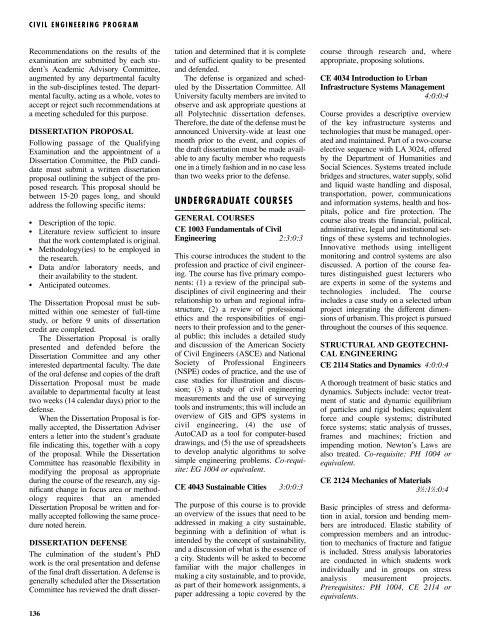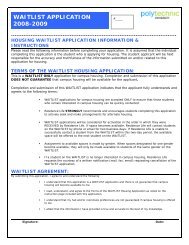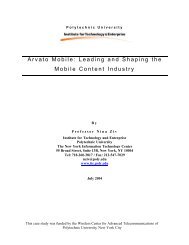POLYTECHNIC UNIVERSITY 2005-2007
POLYTECHNIC UNIVERSITY 2005-2007
POLYTECHNIC UNIVERSITY 2005-2007
You also want an ePaper? Increase the reach of your titles
YUMPU automatically turns print PDFs into web optimized ePapers that Google loves.
CIVIL ENGINEERING PROGRAM<br />
Recommendations on the results of the<br />
examination are submitted by each student’s<br />
Academic Advisory Committee,<br />
augmented by any departmental faculty<br />
in the sub-disciplines tested. The departmental<br />
faculty, acting as a whole, votes to<br />
accept or reject such recommendations at<br />
a meeting scheduled for this purpose.<br />
DISSERTATION PROPOSAL<br />
Following passage of the Qualifying<br />
Examination and the appointment of a<br />
Dissertation Committee, the PhD candidate<br />
must submit a written dissertation<br />
proposal outlining the subject of the proposed<br />
research. This proposal should be<br />
between 15-20 pages long, and should<br />
address the following specific items:<br />
• Description of the topic.<br />
• Literature review sufficient to insure<br />
that the work contemplated is original.<br />
• Methodology(ies) to be employed in<br />
the research.<br />
• Data and/or laboratory needs, and<br />
their availability to the student.<br />
• Anticipated outcomes.<br />
The Dissertation Proposal must be submitted<br />
within one semester of full-time<br />
study, or before 9 units of dissertation<br />
credit are completed.<br />
The Dissertation Proposal is orally<br />
presented and defended before the<br />
Dissertation Committee and any other<br />
interested departmental faculty. The date<br />
of the oral defense and copies of the draft<br />
Dissertation Proposal must be made<br />
available to departmental faculty at least<br />
two weeks (14 calendar days) prior to the<br />
defense.<br />
When the Dissertation Proposal is formally<br />
accepted, the Dissertation Adviser<br />
enters a letter into the student’s graduate<br />
file indicating this, together with a copy<br />
of the proposal. While the Dissertation<br />
Committee has reasonable flexibility in<br />
modifying the proposal as appropriate<br />
during the course of the research, any significant<br />
change in focus area or methodology<br />
requires that an amended<br />
Dissertation Proposal be written and formally<br />
accepted following the same procedure<br />
noted herein.<br />
136<br />
DISSERTATION DEFENSE<br />
The culmination of the student’s PhD<br />
work is the oral presentation and defense<br />
of the final draft dissertation. A defense is<br />
generally scheduled after the Dissertation<br />
Committee has reviewed the draft dissertation<br />
and determined that it is complete<br />
and of sufficient quality to be presented<br />
and defended.<br />
The defense is organized and scheduled<br />
by the Dissertation Committee. All<br />
University faculty members are invited to<br />
observe and ask appropriate questions at<br />
all Polytechnic dissertation defenses.<br />
Therefore, the date of the defense must be<br />
announced University-wide at least one<br />
month prior to the event, and copies of<br />
the draft dissertation must be made available<br />
to any faculty member who requests<br />
one in a timely fashion and in no case less<br />
than two weeks prior to the defense.<br />
UNDERGRADUATE COURSES<br />
GENERAL COURSES<br />
CE 1003 Fundamentals of Civil<br />
Engineering 2:3:0:3<br />
This course introduces the student to the<br />
profession and practice of civil engineering.<br />
The course has five primary components:<br />
(1) a review of the principal subdisciplines<br />
of civil engineering and their<br />
relationship to urban and regional infrastructure,<br />
(2) a review of professional<br />
ethics and the responsibilities of engineers<br />
to their profession and to the general<br />
public; this includes a detailed study<br />
and discussion of the American Society<br />
of Civil Engineers (ASCE) and National<br />
Society of Professional Engineers<br />
(NSPE) codes of practice, and the use of<br />
case studies for illustration and discussion;<br />
(3) a study of civil engineering<br />
measurements and the use of surveying<br />
tools and instruments; this will include an<br />
overview of GIS and GPS systems in<br />
civil engineering, (4) the use of<br />
AutoCAD as a tool for computer-based<br />
drawings, and (5) the use of spreadsheets<br />
to develop analytic algorithms to solve<br />
simple engineering problems. Co-requisite:<br />
EG 1004 or equivalent.<br />
CE 4043 Sustainable Cities 3:0:0:3<br />
The purpose of this course is to provide<br />
an overview of the issues that need to be<br />
addressed in making a city sustainable,<br />
beginning with a definition of what is<br />
intended by the concept of sustainability,<br />
and a discussion of what is the essence of<br />
a city. Students will be asked to become<br />
familiar with the major challenges in<br />
making a city sustainable, and to provide,<br />
as part of their homework assignments, a<br />
paper addressing a topic covered by the<br />
course through research and, where<br />
appropriate, proposing solutions.<br />
CE 4034 Introduction to Urban<br />
Infrastructure Systems Management<br />
4:0:0:4<br />
Course provides a descriptive overview<br />
of the key infrastructure systems and<br />
technologies that must be managed, operated<br />
and maintained. Part of a two-course<br />
elective sequence with LA 3024, offered<br />
by the Department of Humanities and<br />
Social Sciences. Systems treated include<br />
bridges and structures, water supply, solid<br />
and liquid waste handling and disposal,<br />
transportation, power, communications<br />
and information systems, health and hospitals,<br />
police and fire protection. The<br />
course also treats the financial, political,<br />
administrative, legal and institutional settings<br />
of these systems and technologies.<br />
Innovative methods using intelligent<br />
monitoring and control systems are also<br />
discussed. A portion of the course features<br />
distinguished guest lecturers who<br />
are experts in some of the systems and<br />
technologies included. The course<br />
includes a case study on a selected urban<br />
project integrating the different dimensions<br />
of urbanism. This project is pursued<br />
throughout the courses of this sequence.<br />
STRUCTURAL AND GEOTECHNI-<br />
CAL ENGINEERING<br />
CE 2114 Statics and Dynamics 4:0:0:4<br />
A thorough treatment of basic statics and<br />
dynamics. Subjects include: vector treatment<br />
of static and dynamic equilibrium<br />
of particles and rigid bodies; equivalent<br />
force and couple systems; distributed<br />
force systems; static analysis of trusses,<br />
frames and machines; friction and<br />
impending motion. Newton’s Laws are<br />
also treated. Co-requisite: PH 1004 or<br />
equivalent.<br />
CE 2124 Mechanics of Materials<br />
3 1 ⁄2:1 1 ⁄2:0:4<br />
Basic principles of stress and deformation<br />
in axial, torsion and bending members<br />
are introduced. Elastic stability of<br />
compression members and an introduction<br />
to mechanics of fracture and fatigue<br />
is included. Stress analysis laboratories<br />
are conducted in which students work<br />
individually and in groups on stress<br />
analysis measurement projects.<br />
Prerequisites: PH 1004, CE 2114 or<br />
equivalents.




